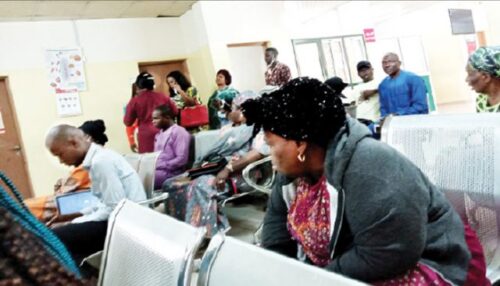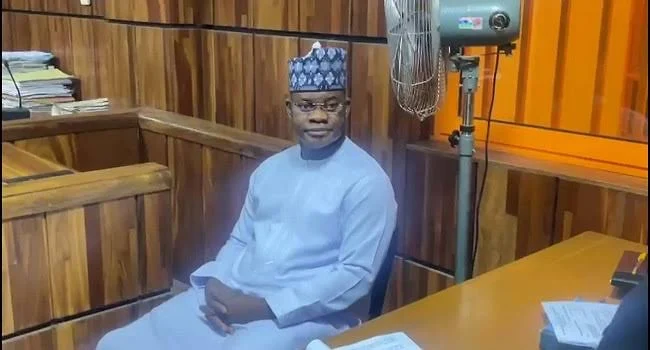Faced with a shortage of nurses, Nigerian hospitals are recruiting retired nurses on contract to bolster their workforce. LARA ADEJORO writes.
Mrs. Turaki has always loved a career in nursing but her passion for the profession is now under strain. The burdens are heavy and many: a shortage of staff, poor working conditions, inadequate equipment and a heavy workload. Most of these are the spin-offs from the massive emigration of medical workers to foreign countries.
In the 15 years, Turaki, who declined to give her first name, has been a nurse, short-staffing has only gotten worse at the tertiary hospital where she works in Bauchi State. Seven of her nursing friends at the hospital have left the shores of the country for greener pastures.
“I’m not enjoying the job again,” she told The PUNCH. “This was not what I thought before joining the profession. I thought it’s meant to get better but things are getting worse; no equipment, no good remuneration.”
Turaki now runs longer shifts and attends to more patients. Normally, she is meant to care for four patients, or at most 10. When she arrives at work, she has to decide which of the 50 patients on the queue needs urgent care or minor surgeries.
“In a day, I attend to at least 20 patients and if I’m on the triaging table, I must attend to about 50 patients daily. I will triage them one after the other to know the department to refer them to. I have to go through their folders and check if they are new cases or they are emergency cases,” she added.
For minor surgeries, between 10 and 15 patients, she has to attend to them one after the other, working hand in hand with the doctors.
“In my clinic, we work from 8 am to 4 pm but if you’re on call, once you close by 4 pm, you remain on duty from that 4 pm till 8 am the next day,” she said.
As a result of the gruelling workload and lack of working tools, Turaki thinks the world is on her shoulders. Her emotions run high, especially when the human cost of the poor state of healthcare delivery adds up. Many times, she breaks down in tears.
“There was a patient who required an emergency tracheotomy but the equipment was not available. We referred the patient to another hospital in Jos, which was the closest but before getting there, he died. The patient’s relatives called to say he died,” Turaki said.
Essential but undervalued
For all her troubles, her pay, she noted, is not worth it. At Grade Level 13, she earns N210,000 monthly. “I’m on CONHESS 12, which is GL 13 in the civil service. Our colleagues that have travelled abroad earn up to N1 million,” she said.
Just like Turaki, Mrs Ameh (real name withheld to avoid reprimand) feels overwhelmed and undervalued. “I enjoy my nursing job but I am overwhelmed. We are only two nurses in the clinic; we get burnt out because we attend to more than 20 patients, sometimes 70 patients a day. This is what we face every day. The work that should have been done by four people is being done by two people,” Ameh, who works in one of the tertiary hospitals in Ondo State said.
Asked whether she is considering leaving the country for where she believes her services will be highly rewarded, she said “yes,” without hesitation.
“If I see the opportunity, I won’t wait, I will go; the work is overwhelming. Today, we attended to more than 30 patients. So, if I have the means to go, I will go. I think about it every day.”
Thousands of nurses like Turaki and Ameh are frustrated on the job due to the increasingly difficult working conditions. At least 57,000 of their colleagues, according to the President of the National Association of Nigeria Nurses and Midwives, Michael Nnachi, left the country between 2017 and 2022 to earn better pay.
More nurses leaving
Despite the World Health Organisation code of practice, which states that member states should discourage active recruitment of health professionals from developing countries facing critical shortages of health workers, the latest data from the Nursing and Midwifery Council shows that there is a big rise in the number of Nigerian-trained nurses who join the register. And a majority of them are young.
The Nursing and Midwifery Council noted that almost half the international joiners last year were aged 30 or under, and a similar number were in their 40s. Only five per cent were 41 and above, compared to 14 per cent of United Kingdom joiners.
The NMC, which is the regulator for nursing and midwifery professions in the UK said many are settling in and around London. However, NMC data does show professionals moving to all corners of the UK and England.
According to the NMC data, 7,256 trained nurses in Nigeria relocated to the UK between March 2021 and March 2022. Stakeholders fear the worst is yet to come as more nurses may leave in droves if no urgent action is taken.
One to 1,660
Nnachi confirmed that the migration of nurses to other countries leaves the burden of care on the few available medical workers. With an estimated population of over 200 million, there is one nurse per 1,660 people in Nigeria, according to Nnachi.
He said, “The concern is that care has to be qualitative but as nurses are leaving, there is such an increase in the workload that if I tell you that it is one nurse to 60 or 80 patients, it might be modest. But if you’re looking at the statistics and population of Nigeria, it is one nurse to 1,660 patients. So, where will the quality care come from?”
Retired nurses to the rescue
To save the situation, hospital managements in Nigeria have decided to call back retired nurses. Some of them believe that retired nurses still have much to offer at 59 or older. Though some hospitals denied resorting to such a scheme, the recruited nurses are talking in anger. After a fulfilling nursing career that spanned 35 years, Abimbola Johnson (not real name) took a bow from Lagos State’s employ in 2019.
Johnson retired as an Assistant Director of Nursing Services in one of the general hospitals in Lagos. The civil service rule in Nigeria mandates civil servants to retire either after serving for 35 years or attaining the age of 60. The former was the basis for Johnson’s retirement as she was 58 years old at that time. But her retirement phase was short-lived and she found herself back at work two years later.
Johnson, who is now 61, said she was recruited again as staff shortage hit the critical workforce and the pressure on hospitals escalated. Johnson, who is currently working in the health service as a contract worker, said her grade level was stepped down by a rank.
She told our correspondent that many of her colleagues are also back to work, all in a bid to salvage the health sector from collapse.
“I have seen colleagues that have renewed their contract up to four times, some of them have even passed age 65. We see them and we know ourselves. Even in the Lagos University Teaching Hospital, Idi-araba, we have some of our good old hands that are retired and are back there as contract nurses because of the mass exodus of nurses.
“You find out that the majority of us who are retired due to length of service are back to work, especially with the massive exodus of nurses to other countries, bad state of the economy and dull business environment,” the 61-year-old nurse said.
The veteran nurse said she would have felt uncomfortable staying at home when she still had something to offer. “The ability is still there to work. Why would I stay indoors when I still have something to offer, especially when I belong to the class of nurses passionate about the profession?
“My two-year contract ends this December but if I wish to continue, all I have to do is re-apply and renew my contract for another two years,” she said.
Another retired nurse, who wished to remain anonymous, said even though she is contributing her quota to healthcare delivery in the country, she is saddened by the overstretched health system and the paltry salary despite the demands of the job.
The nurse retired this year at age 59 as a GL 16 officer but she was recruited almost immediately as a contract nurse on GL 15.
“Even as a retired nurse, when I begin to look at my gratuity, I am not happy. I look at my counterparts that work with Shell and NNPC; I know what their gratuities are. The government needs to review the salary of nurses and that is one of the reasons young nurses are leaving the country,’’ she said.
Even with the recycling, thousands of positions remain unfilled across the country and service quality has yet to improve. Turaki and her colleagues may have to endure the drudgery for as long as they can.
“We should declare an emergency in the healthcare sector. The workload is enormous and we are overstretched in taking care of patients,” the Chairman of NANNM, Lagos State Council, Olurotimi Awojide, said as he explained how the shortage of nurses undermines the quality of patient care and causes fatigue and burnout.
“It is meant to be one nurse to four patients but because of our peculiarity in Nigeria, we still accepted one nurse to eight patients but now, you will see one nurse to 15 patients. This is not allowing us to provide the expected professional care to the patients.
“Nurses are graduating and leaving immediately after their final year exams because the working conditions are not encouraging. More nurses will still leave; it’s a very serious situation. Almost everybody is planning to go abroad,” he lamented.
A nursing advocate, Bunmi Lawal said though nurses constitute the largest healthcare workforce, little attention is paid to addressing the push factors.
“We know that in the Federal Capital Territory, more than five nurses leave for the US, UK and Saudi Arabia weekly. Our hazard allowance is nothing to write home about despite battling COVID-19, Lassa fever and other deadly diseases.
“You have a situation where one nurse will run the night shift in some of our general hospitals. In hospitals like the National Hospital, Abuja, two nurses run the night shift, no matter the workload. We are left with fewer hands, and the quality of care is poor.
“The government needs to address the issue of remuneration and specialty in the profession, and improve the equipment in the hospitals. Some hospitals still take delivery on the floor,’’ she noted.
Despite all they face, nurses seem to get no recognition as society perceives them to be inferior to doctors. In September, a leaked memo from the Federal Medical Centre, Abeokuta showed that over seven staff collapsed during surgeries in one month due to exhaustion.
The memo written and signed by the Theatre Manager, A.G Fagoyinbo, and dated August 29, 2022, was titled ‘Request to reduce the number of elective surgeries: Two patients per specialty per day.’
“The situation is such that only one peri-operative nurse works in the suite instead of three peri-operative nurses, same with other surgical staff (members). The excess workload has resulted in serious burn-out and extreme tiredness,” the memo read in part.
While denying that the Lagos University Teaching Hospital, Idi-Araba, recycles retired nurses to tackle brain drain, the hospital’s Medical Advisory Committee Chair, Prof. Wasiu Adeyemo, told our correspondent it is time to employ more nurses.
His counterpart at Lagos University Teaching Hospital, Ikeja, Prof Adetokunbo Fabamwo, said medical directors are also in pain as the brain drain digs deeper into the nursing profession.
“We are already down to about 30 percent since about one year now that it got worse,” he said.
“At the state government level, stakeholders have examined the issues and decided to expand the capacity of the School of Nursing in Igando to produce more nurses,” Fabamwo said, as he confirmed the plan to call back retired nurses.
“Some of them are still young and not up to 60 years and some who are 60 are still capable of working. In the last month or two, we have six applications from retired nurses who want to join us,’’ he explained.
He added that the hospital had sought the consent of its governing board in recruiting single qualified nurses for specific areas. Such nurses will be required to acquire their second qualification within two years of recruitment.
“For instance, you can have a registered midwife and they will work in the Obstetrics and Gynaecology department; you can have a registered psychiatrist nurse and they can work in the psychiatry department,” Fabamwo clarified further.
LASUTH has also decided to employ ward assistants to take up the non-nursing responsibilities—laying the bed, bathing the patients and lifting them from the bed.
The nursing and midwifery leader, Nnachi, however, insists the conditions of service must be improved to stem the tide of brain drain.
“Motivation has to do with giving you what you deserve. The nurses should have a peculiar allowance because they are suffering. There is nothing wrong if there is an investment in nursing and opportunities for postgraduate programs. The government can give incentives for postgraduate studies in specialty areas and we need to be recognized and encouraged,” he said.
According to WHO, nurses play a critical role in health promotion, disease prevention, and delivering primary and community care.
“Achieving health for all will depend on there being sufficient numbers of well-trained and educated, regulated and well-supported nurses and midwives, who receive pay and recognition commensurate with the services and quality of care that they provide.
“Investing in nurses and midwives is good value for money. The report of the UN High-Level Commission on Health Employment and Economic Growth concluded that investments in education and job creation in the health and social sectors result in a triple return of improved health outcomes, global health security, and inclusive economic growth,” the UN body said.
FG mum
When contacted on the telephone, Minister of Health, Dr. Osagie Ehanire, requested that a text message be sent to him on the matter.
He has yet to respond to the text message sent to him as of the time of filing this report.
Also, efforts to reach the Minister of Labour and Employment, Dr. Chris Ngige, proved abortive as he could not be reached on the phone.
Credit: The Punch

 BIG STORY1 day ago
BIG STORY1 day ago
 BIG STORY3 days ago
BIG STORY3 days ago
 BIG STORY4 days ago
BIG STORY4 days ago
 BIG STORY3 days ago
BIG STORY3 days ago
 BIG STORY2 days ago
BIG STORY2 days ago
 BIG STORY2 days ago
BIG STORY2 days ago
 BIG STORY21 hours ago
BIG STORY21 hours ago
 BIG STORY3 days ago
BIG STORY3 days ago
























